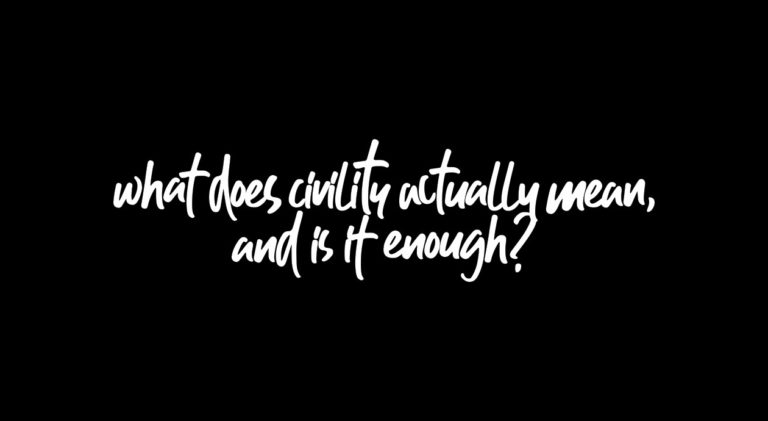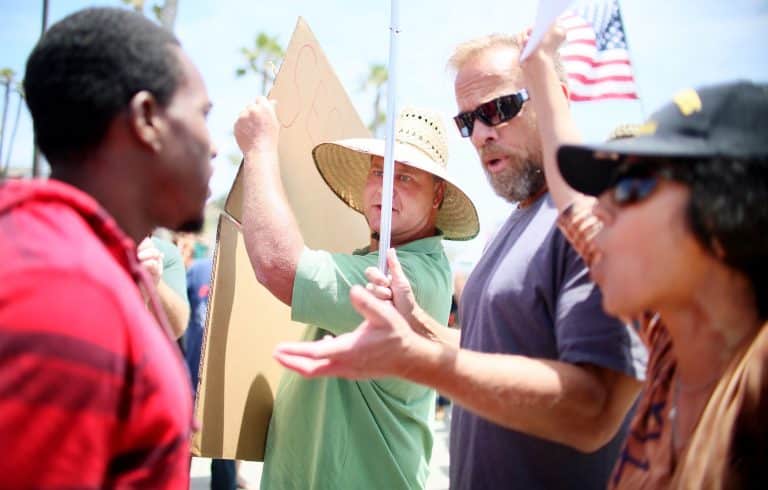Living the Questions
What does civility actually mean, and is it enough?
“I am passionate about what I am passionate about. I’m scared about what I’m scared about, or I’m angry about what I’m angry about. And I know there are things I don’t understand, and I don’t want to stay this way forever, and I don’t want us to stay stuck here forever. So, I want to change and grow, and I invite you to be with me in that spirit too, and let’s see what happens.”
The word “civility” has been used to shut down righteous anger — but it can also open up possibility between us. Krista reflects on what civil engagement really looks like, and how it can challenge all of us to grow.
Living the Questions is an occasional On Being segment where Krista muses on questions from our listening community.

Guest

Krista Tippett created and leads The On Being Project and hosts the On Being radio show and podcast. She’s a National Humanities Medalist, and The New York Times bestselling author of Becoming Wise: An Inquiry into the Mystery and Art of Living. Read her full bio here.
Transcript
Marie Sambilay: Hello, On Being listeners. This is Marie Sambilay, and in this episode of “Living the Questions,” Krista’s responding to a question that one of our listeners sent in. His name is Kevin, and he asks:
“I have been hearing a lot of deconstruction of the word ‘civility.’ The debate around this word has become, like so many other things, binary. ‘Civility’ is either a tool of oppressors to silence those on the margins, or it’s something that is necessary for every single conversation and dialogue. I’d love to hear something about this word — what it actually means, in what contexts can it be helpful, in what contexts can it be used as a tool to silence anger.”
[music: “Rain” by Dustin O’Halloran]
Krista Tippett: Civility as a tool to silence anger. I feel like that’s a new invention. I totally agree that the word is problematic. And the concept, as this question suggests, has even become problematic. My concern for a while has been that the word is too meek, that it’s about being nice and tame and safe. And I don’t think stepping into any of the dark places and the fraught places right now can be nice or tame or safe. I always reach for other words to attach, like “muscular.” It has to be muscular; it has to be robust — this language we use in the Grounding Virtues, “adventurous civility.” It needs to be an adventure.
This moment we inhabit is so complex. I want to say two things at once that, I think, sound like they contradict each other. One is that if safety is endangered, I think some people, many people in many situations right now, have a calling to get safe. They need to protect themselves. They need to protect those they love. That is true.
And then I think that those of us who are safe enough also have a calling to get less comfortable. So when I say that an adventurous civility is not too tame, it’s not too safe, that’s what I mean. It’s not a calling for everybody in every moment. I don’t agree that every situation calls for civility.
And I think the question itself points to part of the rut we’re in, which is that we turn everything into these simplistic binaries. None of this is simple. That’s why it’s an adventure. That’s why it feels dangerous. That’s also why it can be life-giving, and it calls us to our most complex selves.
To use civility to silence anger is using a simplistic, binary understanding of civility as a kind of passive-aggressive weapon, and that’s not what I mean when I use the word. To say that civility is required in every circumstance is a concept that needs a lot of unpacking because civility, at its most complex, is going to have many faces and many kinds of actions and many voices. I think something that can be really important, especially when a word itself gets fraught, is to start to put the word to one side and say what you’re saying. So then, what this is forcing me to reflect on is, what is the other universe of words and actions that I would describe to say what I think this complex civility is?
Like in everything else, I think intentionality is incredibly important. So just like I often say that a conversation starts before any words are spoken — that you frame the space, that you frame your presence — I think civility is internal work that each of us needs to do these days, probably, just as we move through our days, but also, certainly, before you would enter into any space where this question was on your mind, where tensions and conflicts and potential arguments and potential hurt and potential insult, where any of those things might happen. And I would want to say that those would not just include physical spaces but digital spaces because that’s also where we spend our lives these days. So I think an intention to be civil adventurously in the first instance would be to try to be very self-aware, to want to bring your own best self into that room and to figure out what that means.
That would also mean to examine what emotions you are carrying. You may be angry, and anger is a moral response. The question is, what are you going to do with that anger? And I think a question we fail to ask, so much, in American life — we just haven’t hung on to this muscle — is not just, what do I want to happen here; what do I have to say; what do I care about; what is at stake? But what is the most effective way, in fact, that my words can be heard? What is, in fact, the most emotionally intelligent way, which is also going to be a productive way, that I can embody and represent and give voice to what I care deeply about?
All of that would be preparation, would be the inner work of civility that you do before any kind of encounter or conversation. The other quality that would be more other-oriented is to really cultivate some curiosity inside yourself about this situation, the other side of this situation, perhaps the position, perspective of others with whom you’re going to be engaging, with whom you know you disagree on something, to summon in yourself a readiness to encounter them as human beings and not just as their positions or “that other side,” to open yourself to let them surprise you, to let them not be quite as simple or as evil as they may have become in your mind, which is not to say that you expect them to be any different on the positions but that you are going to call yourself to be a full human being, and you’re going to be open to them being a full human being. And that will mean that you understand you bring contradiction to this, and they bring contradiction to this. That can be an opening to be standing on some common ground as human beings, even if you’re not standing on common ground with your opinions.
Ms. Sambilay: It feels like there are a lot of intersections with this parallel conversation that people are having about political correctness. I think when people think about civility, it’s often, “Oh, what are these rules of engagement that are very surface level? What are the things I can’t say?” And like you say, the whole question of civility is really complex, but it sounds like what you’re describing is actually a lot simpler and a little bit more approachable, where it’s just a commitment to seeing the other person as someone who has pain and anger just like you do and flaws just like you do and that you’re both bringing all of that to the interaction.
Ms. Tippett: Yeah, and it’s funny — who said, recently, in our show — oh, I think it was Arlie Hochschild: “Caring is not the same as capitulating.” That is just a really perfect sentence, because what I’m also not advocating — and I think this is so important, Marie. I think this is what people get worried about. If I go in to be civil, does that mean that I relinquish my sense of what is so important and moral and my values and what is at stake here? Does this mean that I put this in my pocket and, in that way, compromise my integrity? And it doesn’t. We don’t have to make that choice. You can decide that you want to engage on a human level with somebody or with some difficult situation or with somebody on the other side — again, this could be digital or could be physical. You can actually really care and really, truly muster some curiosity, really want to understand where they’re coming from and really desire to find the complexity in their position, even if you continue to disagree with it. That is not the same thing as no longer caring about what you believe. You bring your passion with you, but that doesn’t have to be at odds with meeting the passion of another human being.
I really think what civility means to me, what civility needs to become for us to walk together — because we do share a life, whether we like each other or not — I think civility, what it’s opening up as a calling, is about being willing to be present, one human being to another. All those issues and differences can be in the room, but they don’t define what is possible between us.
I think because we have this culture where it’s all about the debate, the argument, “take a vote,” our whole way of thinking about deciding and determining and discerning is about choosing this over that and not about letting in the complexity. But when you let in the complexity, you actually don’t have to take the vote. You don’t have to say, “I’m right, and you’re wrong.” You can believe that; you can actually believe, “I’m right, and you’re wrong,” and you may be. But if you engage, one human being to another, with all of your complexity, you find that you have some questions in common. You find that you both love your children. You find that, together, you love the place you come from. And those become entry points to conversations that you hadn’t even thought about having or hadn’t even realized you could have, to life together that you hadn’t thought about or didn’t realize you could have. All of these things that you disagree with, or the things that have brought you to this place, with very different circumstances, they are still in the room, but they are not the only thing that’s in the room.
And then, of course, the other factor here that’s so un-American and that we have to reintroduce is to have a very long view of time, because human relationship, human transformation takes time. I know I talk about this all the time. Any single encounter is not going to solve anything. It’s just, can an encounter of civility be an opening? Can it open something? Can it soften something that wasn’t soft before?
That’s just this very humble thing that you hold and are grateful for and then that you need to build on with very humble expectations of what can happen in any single moment or any single encounter or any single week or any single year. Again, that humility is a liberation, because then it allows you to be working with time and with change at the pace at which they really work. So, paradoxically, you’re not expecting too much, but you’re then able to actually, really dwell with what is possible in a moment or a day or a week or a year.
Ms. Sambilay: When it comes to people bringing “incivility” or letting their anger or their pain be really palpable in an interaction, I think the goal there that gets lost, it is that desire for growth and that idea that when we are most uncomfortable and internally challenged, that’s when we grow. That’s when we learn, and that’s when we’re most capable of breaking patterns of thinking and behavior that might have been harmful.
I think that’s what the goal is when people are letting that anger show up. It’s like, “I want to shake you out of something that is harming me, but I don’t know how else to do that, other than to make you feel uncomfortable with it.”
Ms. Tippett: I love that. That’s such a really helpful way to think about, “So what is the point of civility?” Because right now, when we’re so hardened, and we’re so aggressive, and we’re so “you’re in or you’re out,” it would not be reasonable to ask any of us to walk into that space and that spirit and let ourselves be uncomfortable. When that’s the atmosphere we create, we all harden ourselves. We all get on guard, so nothing is possible.
Creating spaces and experiences of robust, adventurous civility is actually very strategically effective because what you’re doing is, you’re creating a space in which it is reasonable to ask people, smart people, complicated people who’ve been through complicated things, to let themselves get uncomfortable in the presence of a stranger. Again, it’s not that you’re not who you are, not that you don’t represent all of that, but we’re going to let our complexity show here. And then, again, what happens next or what could happen next is no longer narrowly defined by that thing that divided us and made us so different when we walked into this room.
Ms. Sambilay: It’s that tough love idea, that because I know you’re a human being who can learn and grow, I am going to bring this to our interaction and trust it.
Ms. Tippett: And I bring it, and I say to you, “I believe what I believe. I am passionate about what I am passionate about. I’m scared about what I’m scared about, or I’m angry about what I’m angry about. And I know there are things I don’t understand, and I don’t want to stay this way forever, and I don’t want us to stay stuck here forever. So, I want to change and grow, and I invite you to be with me in that spirit too, and let’s see what happens.”






